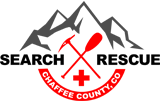Chaffee County Search and Rescue North completed the test for accreditation by the Mountain Rescue Association’s Rocky Mountain Chapter on Jan. 28 by performing a staged avalanche rescue.
“We’re now going to have a governing body watching us, making sure we’re keeping up with national standards,” said SAR-North’s James Orlet. A member of Chaffee County SAR for 12 years, Orlet was the team’s training director from 2016 to 2017.
To pass the test, an SAR crew needs the unanimous approval of a panel of other MRA members who observe the team conduct rescues in staged scenarios testing high angle technical rescue, Scree field evacuation, winter rescue and avalanche operations.
Orlet said the team put in 700 hours of training to get the accreditation.
In training, Orlet said that the team grew the most in their skills with high-angle rescues, which often involve using technical climbing on class five terrain to reach an injured party.
“It gave a whole bunch of people skills they didn’t have before,” Orlet said.
SAR-North completed all but the Avalanche test over a weekend of December 15-17, according to team training director Heath Wharton.
“They wanted to see the avalanche portion again,” Wharton said. “They wanted to observe that our command staff is able to synthesize all of the information.”
Wharton, a member of SAR-North since 2015, took the position of training director in January.
“The greatest benefit that came out of this was seeing the team rise to the occasion,” he said. “Prior to this, we had one or two guys who were really strong at setting anchors and doing high-angle rescue, now we have several.”
The rockies are “considered one of the more technical regions” in the MRA’s national purview, Wharton said.
“They’re considered the most stringent, challenging group in the country,” Orlet said.
And Chaffee County, with its well-known superlatives in mountaineering and whitewater rafting, also poses challenges that many MRA teams aren’t faced with.
“We have a very active river. The same team has to be able to go up into the mountains or down into the river,” Orlet said. “Most teams don’t have that kind of terrain.”
Orlet estimated that SAR-North went out on 71 missions in 2017, a number that is “steadily upticking” year after year.
“There were times this summer where we had three or four a day,” he said.
Fortunately, that rate slowed considerably into the fall and winter, when the team began focusing heavily on training.

